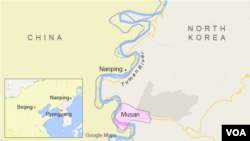China recently confirmed that three of its citizens were killed in a cross-border slaying that may have been carried out by North Korean soldiers.
The incident is the third time in the past eight months that Chinese who live along the country’s porous border have been killed in incidents involving North Koreans, and that is raising concerns about security.
It has been a week since Chinese authorities released a few scant details about the killings. Their confirmation of the incident only came after South Korean media broke the news linking North Korean soldiers to the three deaths.
Three killed
Authorities said the three who were killed include a 56-year-old man, surnamed Zhao, his 26-year-old daughter and a 67-year-old man. All three were not residents of Nanping Village, an area that is remotely located right across the river from North Korea.
Authorities have yet to provide any details about why they may have been targeted or what they were doing in the village.
Nanping is the same village where a North Korean soldier crossed over last December, killing four residents. China filed a complaint with North Korea in response and the incident was seen by some as the latest example of the tenuous state of ties between Beijing and Pyongyang.
North Korea defied longtime ally China in 2013, carrying out its third nuclear test. Later that year, Kim Jong Un had his uncle Jang Song Thaek executed. Jang was a promoter of commercial ties with China.
Lu Chao, a professor at the Liaoning Academy of Social Sciences, said food shortages across the border could be fueling desperate acts. He said it could be related to the internal situation of North Korea’s military.
Lu said those who have come across were soldiers and they were carrying weapons. He said this has happened in the past, but never so frequently in the short space of time and that could be related to events within the military.
Soldiers on border
Chun Ki-won, a pastor with Durihana, a South Korean Christian organization that helps North Korean refugees, said in the past, defectors did not need the help of soldiers to make it across the border. That all changed in 2010 when both China and North Korea started clamping down.
Chun said that although soldiers are supposed to protect the border, they also need to earn money.
Brokers need North Korean women — many of whom become prostitutes or brides for Chinese men — and there are also those who want to go to China. He said they all have common interests.
Chun said that while it is unlikely that the incidents will have a broader impact on relations between the two countries, public opinion is likely to worsen.
The incident has sparked a broad debate on social media in China, with some accusing South Korea’s media of trying to stir up tensions between the two countries.
One Weibo user argued that the occurrence of several incidents in a row not only highlights the seriousness of food shortages in North Korea, but the holes in China’s massive defense spending.
Some Chinese newspapers and commentaries online have responded to the news of the slayings with dismay, not only because of the violence, but because they first learned of the incident from overseas media.
In a recent editorial on the slayings, the Beijing News voiced its shock and concern that yet another slaying had occurred. The editorial said that regardless of what happened, authorities should take measures to guarantee the safety and security of Chinese citizens living near the border.
Youmi Kim contributed to this report from Seoul.








